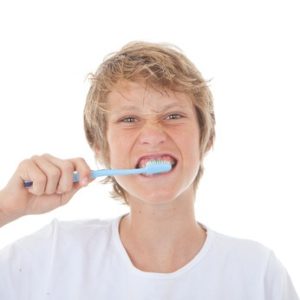Recently, I walked into my son’s bedroom, where he’d been playing video games for nearly an hour. The unpleasant scent of musk hit me like a ton of bricks. Oh my, I thought! Is that you, honey? And, it was! Unbeknownst to him, he did not detect anything. Nevertheless, my maturing 13 yr.-old son was not wearing enough deodorant.
Moms, dads…can you relate?
Or, have you witnessed your son step into the bathtub and when he was done the water looked the same? Of course, no soap was used. With our fast-paced lives, we’d love to assume our young males will clean themselves, thoroughly, without supervision. Well, not always.
So, what do we do? We take action! Certainly, we do not want them to develop poor hygiene and risk social isolation.
Here are a few reminders to mention to your son, so he can look, smell and feel his best.
- Daily showers or baths. Twice a day is preferably but at least once is necessary. This is the ideal time to cleanse the body of dirt, oil, sweat, bacteria, germs, dead skin cells, etc. They should scrub themselves, thoroughly, from their face to their feet, which can be neglected. Make sure they don’t forget to shampoo their hair to prevent lice and/or odor. Bathing with a clean wash cloth and drying themselves with a clean bath towel are key. Using a mild soap is a great choice…and encourage moisturizing to avoid dry, scaly skin.
- Oral care. According to the American Dental Association (ADA), poor oral hygiene can lead to cavities, tooth decay, gum disease and other health problems. So, the ADA recommends brushing and flossing – with mouthwash – at least twice a day, replacing the toothbrush every three or four months and using an ADA-accepted fluoride toothpaste. Click on the video link to review proper brushing techniques with your son.
- Apply deodorant. Sweating becomes more frequent as young males progress through puberty. Unlike antiperspirants, deodorant does not reduce moisture only controls odor. An antiperspirant eliminates odor and keeps sweat glands under control. Sometimes it is trial and error to find the most effective deodorant. Some adolescents need more protection than others depending on physical activity and body chemistry. It could be a fun outing to the store and allow your son to choose his favorite scent.
- Wear clean clothes. It is difficult to tell if clothes are clean or dirty with a glance. Even if there are no stains, clothing may not be fresh enough to wear twice without washing. The best inspection method is to smell the underarms (it never fails). Dirty clothes do smell. If it fails this test then tossing it into the dirty pile is best. Oh, be sure to suggest a clean and a dirty clothes basket to organize laundry.
- Wash hands. Handwashing is one of the best defenses against the spread of germs. We pick up all sorts of germs from various objects and others, constantly. A good rule of thumb is to wash hands under warm water for at least 20 to 30 seconds. Another suggestion is to make sure your son’s nails and toenails are clipped, often, to prevent a breeding ground for bacteria.
 Being consistent and remaining vigilant about personal hygiene – not only fosters responsibility – but a healthier life. At Woman’s Foundation, Inc., we can assist by re-enforcing hygiene practices during our initial Body Talk course.
Being consistent and remaining vigilant about personal hygiene – not only fosters responsibility – but a healthier life. At Woman’s Foundation, Inc., we can assist by re-enforcing hygiene practices during our initial Body Talk course.
Our Let’s Talk: Puberty Series is comprised of three classes – Body Talk (ages 9 – 11), Beyond Body Talk (ages 12-14) and Sex, Truth and Consequences (ages 15-18). Each class is held separately for boys and girls with knowledgeable instructors who provide age-appropriate information. Depending on age, topics range from hygiene and body development to consequences of risky, sexual behavior and making positive choices. One of the advantages of taking part in our classes is that participants leave with a book on puberty for future reference.
Learn more and register for our next Body Talk Boys class on Wednesday, March 29th in the Woman’s Foundation Classroom from 6 p.m. to 8 p.m. Visit our website to find program schedules, times, directions to our facility and information on various programs. Or, give us a call at (337) 988-1816.
Growing up is tough; we can help.







